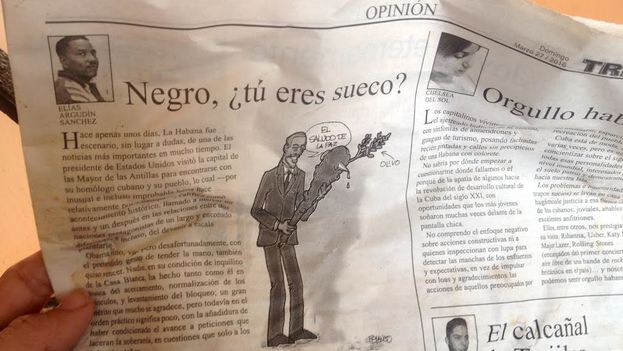
![]() 14ymedio, Reinaldo Escobar, 31 March 2016 — The poet and literary critic Victor Fowler Calzada published in Sandra Abd’Allah-Alvarez Ramírez’s blog, “I had be to a Black Cuban Woman,” a protest and at the same time a call to solidarity in response to the publication of an opinion column titled, “Negro, are you Swedish,” that criticizes President Obama’s behavior during his visit to Cuba.
14ymedio, Reinaldo Escobar, 31 March 2016 — The poet and literary critic Victor Fowler Calzada published in Sandra Abd’Allah-Alvarez Ramírez’s blog, “I had be to a Black Cuban Woman,” a protest and at the same time a call to solidarity in response to the publication of an opinion column titled, “Negro, are you Swedish,” that criticizes President Obama’s behavior during his visit to Cuba.
The article in question appeared in the printed version on Monday and was inaccessible in the online edition until this Wednesday, when the author himself published an apology. Victor Fowler’s indignation was justified not only because his ID card has the capital letter “N” to denote the color of his skin, but also because even if he were blond with blue eyes he would feel indignant at what he clearly classifies as a racist attack.
But if columnist Elias Argudín of the Havana weekly (who shares with Fowler the letter N on his ID) was just trying to make a bad joke when he said “There is no doubt, Obama overdid it. I can not help but ask – in the style of Virulo, a Cuban comedian and singer/songwriter – “But Negro, are you Swedish?”
Immediately following he does something which in my judgment is much worse, when he says, very seriously, “We were very courteous, including allowing [Obama] to speak alone (and at his ease) with the enemies in his own house,” a reference to Obama’s meeting with members of Cuba’s independent civil society at the US Embassy.
Anyone who does not like the adjective “black” to identify an African-American should also feel the stigma of “enemy” to refer to those who think differently from those who govern us, and not because among the thirteen Cubans who met with the US president there were three dignified representatives of dark-skinned people, but because, to paraphrase an argument from Fowler himself, we would have to say that along with racial differences, we should not let the some political offense go by without confronting it.
Victor Fowler can count on the solidarity of those thirteen Cubans, including those who are white or mixed-race, because the issue of racial discrimination is present in all the agendas of independent civil society. It seems much more serious that discrimination on political grounds enjoys public acceptance in our society and is a source of pride for those who disguise their ideological intolerance as revolutionary intransigence.
